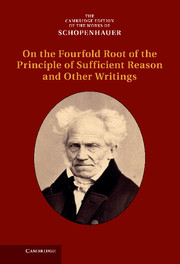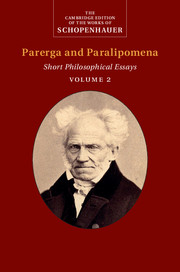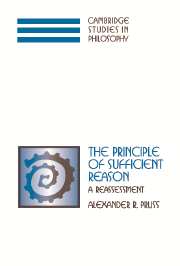Schopenhauer: On the Fourfold Root of the Principle of Sufficient Reason and Other Writings
This volume of translations unites three shorter works by Arthur Schopenhauer that expand on themes from his book The World as Will and Representation. In On the Fourfold Root he takes the principle of sufficient reason, which states that nothing is without a reason why it is, and shows how it covers different forms of explanation or ground that previous philosophers have tended to confuse. Schopenhauer regarded this study, which he first wrote as his doctoral dissertation, as an essential preliminary to The World as Will. On Will in Nature examines contemporary scientific findings in search of corroboration of his thesis that processes in nature are all a species of striving towards ends; and On Vision and Colours defends an anti-Newtonian account of colour perception influenced by Goethe's famous colour theory. This is the first English edition to provide extensive editorial notes on the different published versions of these works.
- These essays reveal Schopenhauer's controversial views on science, explanation and the essence of nature
- The first English translation to provide thorough scholarly notes on the differences between editions
- The volume includes a substantial introduction to all three works
Reviews & endorsements
"...it’s a pleasure to welcome the latest volume from the Cambridge University Press uniform series of the philosopher’s works, On the Fourfold Root of the Principle of Sufficient Reason and Other Writings, published just last month. The enthusiast will be very glad to see that, along with a new translation of Schopenhauer’s dissertation, there are also new translations of On Vision and Colors and On Will in Nature, the first influenced by the young Schopenhauer’s friendship with the older Goethe and the second a treatise about the ways in which Schopenhauer’s metaphysical “will” operates through the physical world. These essays have been among the hardest to get a hold of, and now that we have these new translations (by David E. Cartwright, Edward E. Erdmann, and Christopher Janaway), we can look forward to meeting Schopenhauer’s expectations of us through the rest of the winter..."
--George Hunk, Superfluities Redux
"This new translation of three of Schopenhauer’s essays is of a very high quality and is testament to the customary rigor of the Cambridge Translations, Undoubtedly, this new edition will become in time the standard work of reference for English-speaking scholars worldwide."
Dennis Vanden Auweele, Leuven, Philosophischer Literaturanzeiger vol. 66 (2013), no. 2
Product details
November 2012Hardback
9780521872713
558 pages
235 × 157 × 33 mm
0.93kg
8 b/w illus.
Available
Table of Contents
- General editor's preface
- Editorial notes and references
- Introduction
- Notes on text and translation
- Chronology
- Bibliography
- Part I. On the Fourfold Root of the Principle of Sufficient Reason:
- 1. Introduction
- 2. Survey of what is most important in previous teachings about the principle of sufficient reason
- 3. Inadequacy of previous accounts and sketch of a new one
- 4. On the first class of objects for the subject and the form of the principle of sufficient reason governing in it
- 5. On the second class of objects for the subject and the form of the principle of sufficient reason governing in it
- 6. On the third class of objects for the subject and the form of the principle of sufficient reason governing in it
- 7. On the fourth class of objects for the subject and the form of the principle of sufficient reason governing in it
- 8. General remarks and results
- Variants in different editions
- Collation of the two editions
- Part II. On Vision and Colours:
- 9. On vision
- 10. On colours
- Variants in different editions
- Part III. On Will in Nature:
- 11. Introduction
- 12. Physiology and pathology
- 13. Comparative anatomy
- 14. Plant physiology
- 15. Physical astronomy
- 16. Linguistics
- 17. Animal magnetism and magic
- 18. Sinology
- Reference to ethics
- Conclusion
- Variants in different editions
- Glossary of names
- Index.




